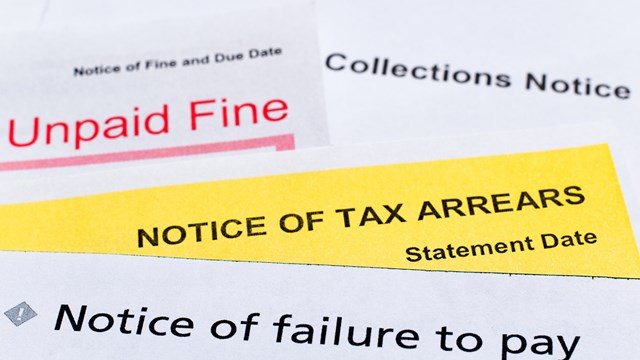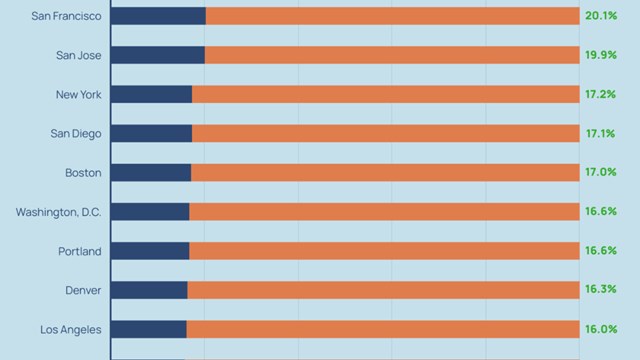In New York City, many co-ops and condos use a practice called a "flip tax" in order to boost building revenue. A flip tax is a fee paid either by the purchaser or seller that goes back to the co-op or condo each time an apartment is sold, or "flipped." In New Jersey, the concept of the flip tax exists in several forms, but the term "flip tax" is almost never used.
According to Edward S. Frank, a property manager with Arthur Edwards Inc. in River Vale, "A New Jersey co-op shareholder filed a lawsuit about 15 years ago on behalf of all the co-op owners in New Jersey, challenging the issue mostly because of the word 'tax.' People seem to shy away from a term that has 'tax' in it. That is why you don't hear the term 'flip tax' in New Jersey," he says. "On the co-op side they call it a 'realty transfer fee' and on the condo side they call them 'resale contributions.'"
Only in New York
In New York City, more than 60 percent of co-ops have a flip tax in place. A recent study by the law firm of Stroock Stroock & Lavan found that a majority of condominiums in the state are now considering instituting flip taxes also. And why not? They can bring in money—and they might help a condo board to reduce common charges like maintenance fees.
"Essentially what's happening is associations are looking for ways to raise revenues when one unit owner sells to a new unit owner," says Jules Frankel of Wilkin & Guttenplan, a CPA firm in New Brunswick. "This is how associations raise money when a unit is transferred."
In New Jersey, unlike New York, co-ops are not the dominant animal—and this has probably played a part in flip taxes not being much heard of around the boards and associations of the state. There is also case law that prohibits flip taxes in some instances. A board can not just decide to institute a flip tax—there are procedures that must be followed.
"Flip taxes are illegal unless specifically authorized by the governing body," says Attorney Ronald L. Perl, a partner in charge of the community association practice group for Hill Wallack in Princeton. "They are permitted only if authorized in the original master deed or bylaw or amended to include them. I think New Jersey courts were concerned with giving governing boards—often just five or seven people—the authority to impose this without some sort of vote by the owners."
If it does get written in the documents, the fee can be the responsibility of the buyer or the seller, depending on what the association decides.
Here it Comes
Thomas Vincent Giaimo, an attorney based in Red Bank, believes that he represents the first condo association to adopt a realty transfer fee in New Jersey. The HOA in question put a 1.5 percent realty transfer fee upon acquisition into the bylaws and placed the onus on the buyer to contribute that percentage of the purchase price back to the association.
"I thought it was very appropriate for community associations in New Jersey to now come up with creative ways to raise income to look into reality transfer or as some people would call it, a flip tax," says Giaimo. "It's a good thing, because we are seeing in New Jersey unprecedented conveyances in title in real estate in general and in community association property in particular. We're seeing explosive development of new communities and seeing a lot of resale because property values are exploding."
The community, Renaissance, is in Northern New Jersey, and Giaimo believes that community associations like this one need to come up with creative ways of increasing revenue for the community without adversely impacting the membership.
"We projected, based on closings of the prior year, that this community could perhaps match 15 to 25 percent of their operating income by the imposition of this realty transfer fee. That's a lot of money," Giaimo says. "I think this is going to be the first in a series of dominoes to fall in this direction. It makes good economic sense for the community association."
Also Known As
Although you won't be hearing "flip tax" in the following instances, there are common mechanisms in New Jersey that essentially have the same effect.
"Number one is called 'working capital contributions,'" says Frankel. "At the time of closing, the purchaser of the unit pays a fee to the association and those monies are earmarked for working capital and are normally two or three months'-worth of [association dues]."
The dollar amounts vary based upon the individual association and the association's documents normally indicate what the money can be used for.
"Some associations have something called a membership fee which is similar," Frankel says. " Same idea. It is paid by purchaser of the unit. Sometimes it's two months-worth of fees, sometimes three months, sometimes a flat dollar amount."
For the condo, the contributions show a sign of good faith by the new owners. Associations want new owners to make contributions to the reserve account because they feel as though it's only a fair thing to do because they are new to the community and everyone who has been there for years has contributed.
"By [new owners] contributing, it's a gesture that they are part of the club," says Frank. "Theoretically, new owners are walking in to a community where predecessors have made contributions for years and they gain that benefit when the move in. It's only fair that they participate."
Putting to Use
The money collected from these methods can be used either for operating expenses or just to build up the reserves.
"As a rule of thumb, what working capital initially is supposed to do in the early years is to help an association accumulate some money so that they have enough money to deal with cash flow needs," Frankel says.
"The [fees] I have seen are mostly utilized to offset regular operating budget or used for enhancements," adds Perl. "Rebuilding a deteriorated wall at the entrance to a community, for an example. If there is a heavy winter storm and there's more snow removal than anticipated, these funds provide a ready source of cash."
The Good, the Bad and the Flip
Capital contributions in modest amounts are very, very common in New Jersey. They are usually only two or three months of maintenance fees, ranging from around $500 to $1,000.
"There are no real drawbacks," Frank says. "The only negative is that you could potentially discourage buyers. The offset to that we live on the east coast where people are used to spending a big chunk of change for a nice piece of real estate—another $300 is not something that's likely to turn them off. In the long run, if you go to sell, or your neighbor goes to sell, they are going to be kicking in this money. You're going to get a payback of this 10 times over."
Giaimo also doesn't believe that this will discourage buyers from coming on board. The board did an analysis before deciding to institute the measure at Renaissance and found no ill effects.
"We felt there would be no adverse impact on sales in the community," he says. "The board always needs to do what's best, but we did an analysis and determined there would be no adverse affect on sales. Boards always have to protect the viability and marketability of the future. A realty transfer fee is a terrific revenue-raising vehicle. We recently stepped up to the plate, and this is the first community in New Jersey to adopt this—I don't know why it took so long."
Keith Loria is a freelance writer and a frequent contributor to The New Jersey Cooperator.







2 Comments
Leave a Comment